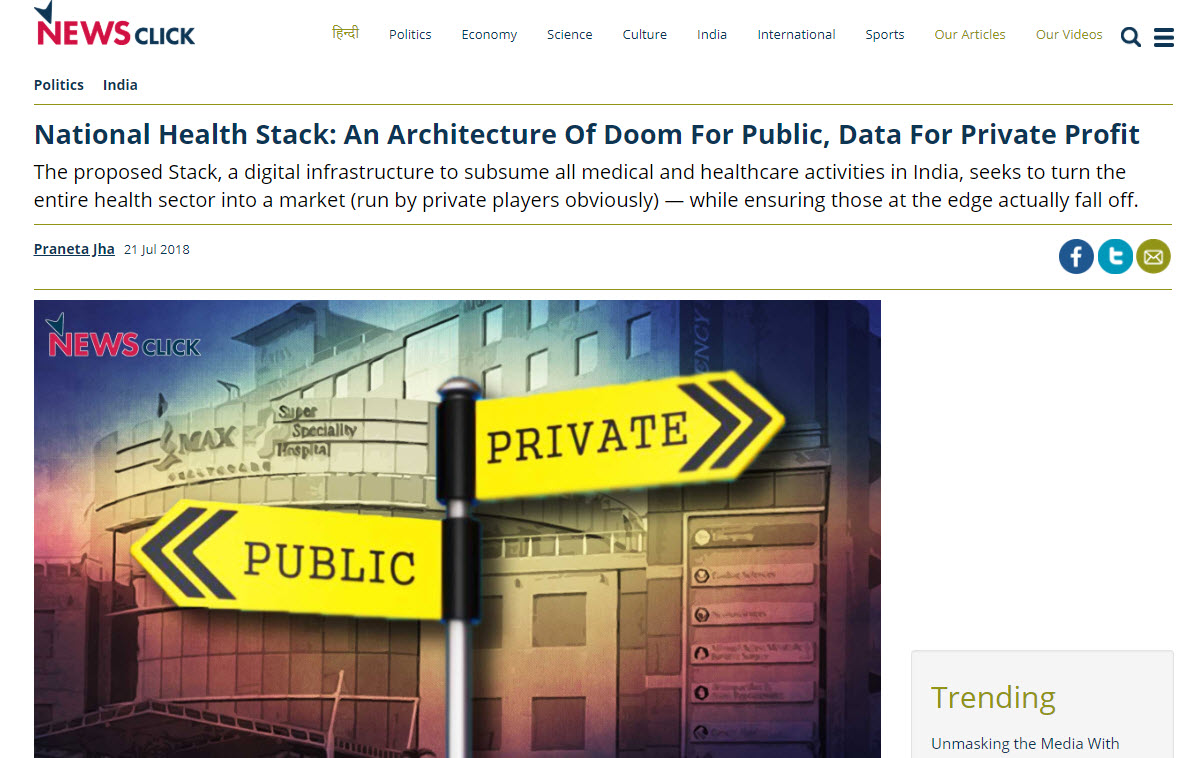A couple of weeks back, Niti Aayog published a document outlining “National health Stack” which was the proposed digital platform architecture to support the Ayushman Bharat program of the Government which is trying to provide a “Social health Security” to the masses.
The NHS outlined a program where there would be a central repository of health care beneficiaries, the service providers, the health data of millions of participants etc.
There is no doubt that the “Storage and Processing of Health Data” which is considered as “Sensitive Personal Data” both under ITA 2008 and PDPA 2018 (proposed) is a proposition which should be flagged for Data Theft Risk. Globally, health data of individuals are targeted by hackers and the best of Companies in advanced countries have not been able to prevent the data breach.
It is also true that when valuable asset is all located or is accessible through a single gateway, it enhances the risk by increasing the reward for the hackers.
However, the benefits of IT can only be harnessed when data is aggregated, analyzed and used with appropriate technology tools. This is true as much for the GST scheme as for the Ayushman Bharat program.
The role of experts in the industry is to flag the risks and suggest remedies. It is to be app reciated that in this spirit of seeking public opinion, Niti Aayog has placed the NHS information in the public domain and sought comments.
reciated that in this spirit of seeking public opinion, Niti Aayog has placed the NHS information in the public domain and sought comments.
Instead of providing constructive suggestions, some journalists however prefer to pass derogatory comments to run down the program before it is launched and this tendency is what I have called the “Sagarika Syndrome”, named after the famed journalist Sagarika Ghosh, (wife of Rajdeep Sardesai) whose Twitter account is a wonderful disposition of how we can speak negatively about anything this Government does or proposes to if the Government is led by a person called Narendra Modi.
I donot think Sagarika is aware of NHS but I came across an article by another gentleman called Praneet Jha (Not aware if he is related to the other famed talker Sanjay Jha) headlined “National Health Stack: An Architecture of Doom for Public, Data For Private Profit” published in a website newsclick.in which reflects exactly this journalistic syndrome of running down every program with a biased view.
I would like to however place my counter views through these columns.
In my opinion NHS is a well intentioned program which is perhaps bigger than the Aadhaar program and would be creating a huge opportunity for the IT industry. The Security concerns are genuine and since we are now looking at the plan, it is possible to build security into the systems at this stage itself and it is the responsibility of all of us to contribute towards this.
The author has quoted one incident in Indiana where a patient missed insurance coverage because the system rejected her identity and uses it as a peg to state that NHS will lead to such instances in India. Technology failures and false positives or negatives are “Errors” which need to be addressed and cannot be eliminated. We can build mechanisms to circumvent this through grievance redressal mechanisms which NHS can address.
The security of the data is proposed to be taken care of through encryption and authentication of access. Yes there could be failures and negligence of the service providers which could leak sensitive data. But this would be the responsibility of the service providers and after the PDPA 2018 coming into being, service providers need to be careful. We cannot blame the NHS which is only a technology backbone.
The scheme envisages a “Trusted Data Fiduciary”, “Smart Contracts”, “Block Chain technology”, “Federated Personal health record” etc which are all innovative concepts.
I wish critics look at the proposal positively and offer their suggestions rather than criticise for criticism sake.
Let’s us propose health criticisms with constructive suggestions and avoid blind criticisms.
Naavi







